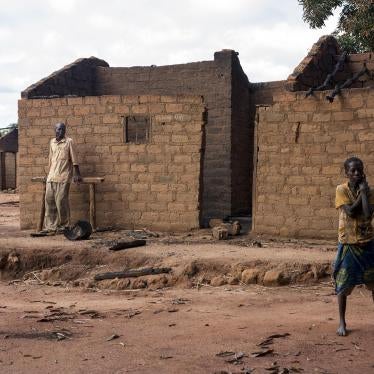Horrific bloodshed has returned to the streets of Bangui, the capital of the Central African Republic, just weeks after the United Nations took over peacekeeping responsibilities from the African Union. It’s the first real test of whether the UN mission, MINUSCA, can bring some relief to the war-torn country following 18 months of bloodcurdling sectarian violence that has left many thousands dead and nearly a quarter of the population homeless and displaced.
According to local sources, the violence began earlier this week, when a Muslim Seleka rebel fighter left a military camp where nearly 1,000 Seleka fighters remain to visit relatives in the capital. On his way, rival anti-balaka militia, who harbor hatred toward Muslims, recognized him and chased his taxi. The Seleka fighter threw several grenades at his attackers, wounding bystanders. When the Seleka fighter was caught, he was lynched, his body mutilated, and his remains set on fire.
On Wednesday his charred corpse was returned to his relatives, setting off a new round of violence. A hapless taxi driver was dragged from his car and lynched by a mob of angry Muslims. The charred remains of the Seleka victim were taken to the MINUSCA base. The angry mob looted and burned shops near the base, although peacekeepers did not intervene. The owners of the shops and homes affected responded to the angry mob and more violence ensued.
When the peacekeepers later dispersed the mobs, tensions were at a boiling point. Anti-balaka militia had descended from all over town, taking over the main roundabouts and putting up barricades, apparently in preparation for an assault on the capital’s only remaining Muslim enclave.
For the past two days, gunfire and explosions have rung out across the capital, bringing back memories of the inferno between December 2013 and April 2014, when lynch law ruled the streets and hundreds died in communal violence.
Peacekeepers’ attempts to retake control of the streets came at a price: on Thursday evening, a joint Pakistani-Bangladeshi peacekeeping patrol was ambushed near the outskirts of the city by unknown armed assailants, killing a Pakistani officer and wounding several others – the first UN casualties of what is sure to be a challenging mission.
This latest incident shows how fragile the situation remains in the capital and how crucial it is for UN peacekeepers to respond quickly and robustly to even the slightest hint of violence. Within a matter of hours a small incident can spiral out of control, bringing the rival militias back onto the streets. Each time it is civilians who pay the price.
Everyone in the Central African Republic needs to understand that UN peacekeepers will not hesitate to act in compliance with their mandate and international standards to protect civilians under threat, using force if they must. It is imperative for the UN peacekeepers to establish that they enforce law and order in Bangui, and the brutal militias do not rule the streets.
Equally important is that the warring parties and their leaders understand they will be held accountable for the crimes they commit, and that politicians on all sides are on notice that incitement to violence, and the use of violence for political objectives, will be prosecuted.





